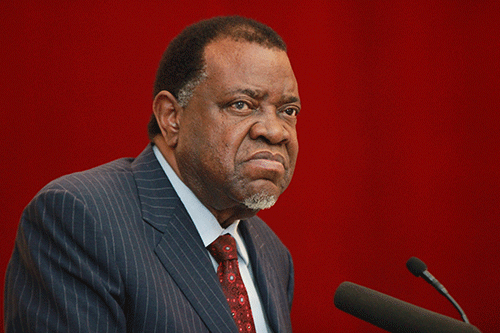President Hage Geingob has said Namibia’s commitment to press freedom is evidenced by the country’s consistent top ranking on the continent and globally.
This is further buttressed by the recent promulgation of access to information legislation.
“It is in itself a demonstration of the commitment of the government to ensure access to information as a core pillar of effective governance,” Geingob said in an opinion published by this paper today.
Today, the world marks the International Day for Universal Access to Information under the theme, ‘The Importance of the Online Space for Access to Information’.
Geingob then called on upon all stakeholders, including government agencies, civil society organisations and the private sector to collaborate in creating an online space that is safe, accessible and inclusive for all.
“Let us also promote digital literacy and ensure our citizens can navigate the internet with confidence, distinguishing between reliable sources and misinformation,” he urged.
Namibia’s first Prime Minister added: “With the rapid advances in the online space as a gateway to knowledge, a platform for dialogue and a catalyst for progress, Namibia has embraced the digital age, recognising that the internet is a powerful tool for promoting transparency, accountability and inclusive development.”
Industry voices
New Era also solicited input from industry gurus on the state of access to information in the country.
One of them was Namibian Sun news editor Mathias Haufiku, who stressed that although there are pockets of challenges as far as the implementation of the Access To Information law, it should not deter “us from acknowledging the strides we have made over the years”. “The implementation of the commissioner’s office must be prioritised to ensure we have a concrete structure in place to implement the mandate of the office,” Haufiku said.
Government has set aside N$20 million for the establishment of the information commissioner’s office for the current financial year.
“It is my hope that the person who will be chosen to hold this office is someone of high ethical and moral values – one who is well-versed with the diverse needs of the media corps. Those tasked to make these appointments must refrain from appointing people who are easily bullied or intimidated,” Haufiku said.
Adding his voice to the discourse was The Namibian’s editor, Tangeni Amupadhi, who acknowledged the progress made since the ATI’s enactment.
“We urge the government to use that momentum in making the law practical. Without having procedures to compel officials to provide information to the public and through journalists, it will always be at the mercy of individuals,” Amupadhi said. Meanwhile, Namibia Media Professional Union (Nampu) acting secretary general Jemima Beukes said access to information in Namibia remains an uphill battle, albeit journalists generally enjoy a degree of freedom.
“One main thing is the perceived lack of transparency and accessibility within government offices – and in most cases, journalists are forced to approach officials basically ‘hat in hand’, pleading for essential information that should be readily available.”
“It is important for journalists to have the correct information to inform and educate the nation for them to, in turn, make informed decisions about their lives, finances and education as well as their decisions at the ballot box,” said Natasha Wahengo, New Era’s editor: Day.



